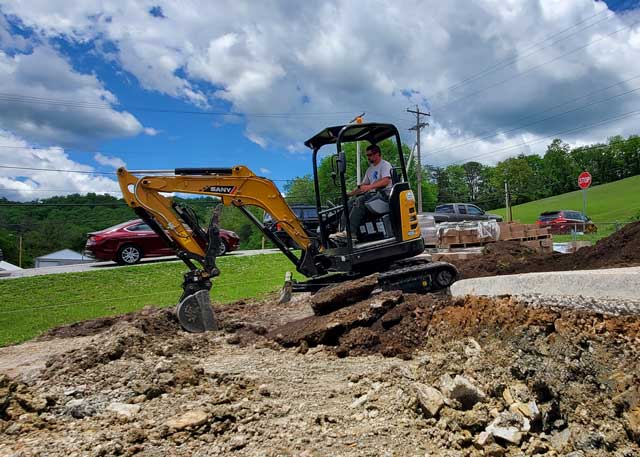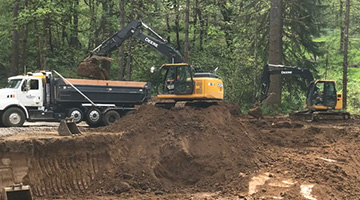Industrial Lancaster Trenching - Trenching Solutions for Companies in Lancaster
Industrial Lancaster Trenching - Trenching Solutions for Companies in Lancaster
Blog Article
In-Depth Exploration: The Scientific Research Behind Superior Excavation Practices
The world of excavation techniques is a domain where scientific research intertwines with craftsmanship to uncover the mysteries hidden under the earth's surface area. From ancient hand tools to contemporary hydraulic excavators, the advancement of excavation techniques has actually been a testament to human ingenuity and technological developments. However, what genuinely establishes premium excavation methods apart is a deep understanding of geological concepts, combined with the use of innovative tools and approaches. By checking out the scientific research behind these methods, we can discover the keys that exist beneath our feet and value the accuracy and knowledge that enter into every dig.
Advancement of Excavation Methods
Throughout history, the evolution of excavation strategies has actually played an important function in advancing building and construction practices and archaeological explorations. From the primary tools used by our forefathers to the sophisticated equipment used in modern times, the progression of excavation methods has considerably changed exactly how we come close to numerous jobs.
In old times, hands-on labor with fundamental devices such as shovels, pickaxes, and wheelbarrows was the key approach of excavation. This labor-intensive procedure limited the depth and extent of excavations, often causing slow progress and restricted accessibility to certain websites. Nonetheless, as worlds progressed, so did the techniques and tools utilized for excavation.
The Industrial Transformation noted a transforming factor in excavation methods with the intro of steam-powered equipment. In modern times, modern technology plays a critical function in excavation, with improvements like General practitioner systems, drones, and 3D scanning improving accuracy and performance in the area.
Function of Modern Technology in Excavation

The combination of advanced modern technology has actually essentially revolutionized the field of excavation, boosting precision and performance to unprecedented degrees - lancaster excavation. One of the crucial technical improvements that has substantially impacted excavation methods is the utilization of GPS systems.
Moreover, the introduction of 3D modeling and simulation software program has structured the planning procedure for excavation tasks. Drivers and designers can now picture the whole excavation process prior to breaking ground, recognizing prospective challenges and enhancing workflow. Combined with this, the implementation of drones in excavation activities has actually facilitated aerial surveys, volumetric measurements, and website examinations with unmatched speed and accuracy.
Geological Principles in Excavation
An understanding of geological concepts is essential for guaranteeing the structural stability and stability of excavation websites. Geological variables play an essential function in figuring out the feasibility and safety of excavation projects (dump truck companies in ohio). One vital geological concept to take into consideration is the sort of dirt or rock existing at the website. Various dirt kinds, such as clay, crushed rock, or sand, have varying levels of stability this article and need different excavation methods. For circumstances, cohesive soils like clay may require additional support to stop collapses, while sandy soils might be prone to erosion throughout excavation.
Additionally, the geological structure of the location, including mistakes, cracks, and rock formations, have to be very carefully examined to identify possible dangers and challenges. Digging deep into near fault lines her response or unpredictable rock formations can lead to instability and possible risks. By performing detailed geological surveys and evaluation, excavators and designers can establish approaches to alleviate threats and ensure the effective completion of excavation tasks. Eventually, including geological principles right into excavation practices is vital for attaining risk-free, reliable, and sustainable outcomes.

Latest Tools for Excavation
In the realm of excavation techniques, modern advancements in tools have revolutionized the effectiveness and precision of excavation procedures. These drones can supply detailed aerial studies of excavation websites, providing real-time data on topography and potential threats.
One more cutting-edge tool acquiring popularity is the implementation of 3D printing modern technology for producing customized excavation equipment. This allows for the production of specialized devices that are tailored to the certain requirements of a task, boosting efficiency and decreasing downtime.
Furthermore, improvements in materials science have actually led to the growth of stronger and extra long lasting excavation tools. lancaster excavation. Tungsten carbide-tipped excavator add-ons, for instance, deal remarkable performance in difficult ground conditions, improving performance on-site
Scientific research's Influence on Excavation Practices

Additionally, advancements in products scientific research have led to the creation of more powerful, a lot more resilient excavation tools and equipment. For example, making use of composite materials in miners and shovels has actually improved their efficiency and long life, eventually increasing performance on excavation sites. In addition, scientific study on dirt auto mechanics and geotechnical engineering has actually supplied useful insights right into soil behavior, allowing excavation specialists to make educated choices pertaining to excavation techniques and dirt stablizing techniques. Generally, science remains to drive technology and enhancement in excavation techniques, making excavation projects extra efficient, economical, and sustainable.

Final Thought
Finally, the development of excavation techniques has been greatly affected by innovations in modern technology and a deeper understanding of geological principles. The most up to date devices and devices made use of in excavation have improved efficiency and accuracy in the field. The application of scientific expertise has actually substantially enhanced excavation practices, bring about a lot more lasting and reliable techniques for excavating various kinds of products.
In the realm of excavation methods, contemporary technologies in devices have actually reinvented the effectiveness and precision of excavation processes. By leveraging scientific concepts, the excavation sector has actually been able to substantially enhance effectiveness, precision, and safety and security in excavation procedures. GPR enables excavation teams to non-invasively scan and map subsurface structures, energies, and possible dangers, enabling them to plan excavation projects with better precision and decreased risk of accidents.
In addition, clinical research study on soil technicians and geotechnical design has supplied useful understandings into soil behavior, permitting excavation specialists to make enlightened choices pertaining to excavation techniques and soil stabilization methods. On the whole, scientific research proceeds to drive development and enhancement in excavation practices, making excavation tasks much more reliable, economical, and sustainable.
Report this page